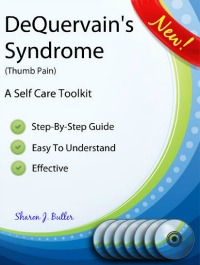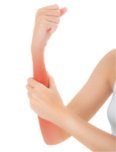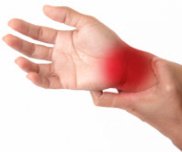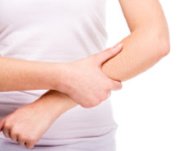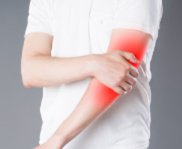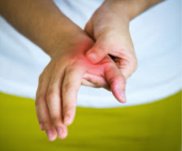DeQuervains Syndrome Symptoms
DeQuervains Syndrome Can Feel Like Arthritis Of The Thumbs
While there is usually no numbness or tingling associated with DeQuervains Syndrome, the arthritis-like symptoms can be severe, long lasting and can seriously affect the use and function of the thumb and hand. Any movement of the thumbs is painful. Hobbies and sports take a back seat in your life. For this reason, a carefully crafted program of self care is especially important.
Pain Crosses The Wrist and Into The Forearm
DeQuervains Syndrome symptoms involve the thumb and the muscles and
fascia that cross the thumb joint and extend into the arm. In deQuervains Syndrome, movement of the thumb becomes very painful, feeling somewhat like arthritis in the thumb joint. The muscle and tendon that lift the thumb toward the back of the hand are also often involved in this injury. When moved, pain extends from the base of the thumb, across the wrist and into the top of the forearm following the path of the extensor muscles of the thumb.
Pain In The Web Joining The Thumb and Palm
It is also possible to have symptoms of pain, restriction, aching, or shortness in the web of tissue that joins the thumb to the palm. It is common for this tissue to become short and tight in deQuervains Syndrome, causing, I believe, a destabilization of the joint at the base of the thumb, leading to intense arthritis-like pain when the thumb is moved.
Tissue Change Begins In The Shoulder!
If you pay close attention, you can feel a faint sense of movement in the muscles and soft tissues that lead from the thumb all the way to the top of the arm at the shoulder when the thumb is lifted. This indicates that tissues connected through the matrix of fascia extending from the thumb to the shoulder is also involved in DeQuervains Syndrome. If the condition of these remote tissues are ignored in the recovery process, then results will not last long.
To learn more about deQuervains Syndrome, visit the following sections:
deQuervains Syndrome Anatomy
deQuervains Syndrome Self Care
Click the block below that most closely matches your injury for more information and to find the Toolkit we offer to help you in your recovery.
